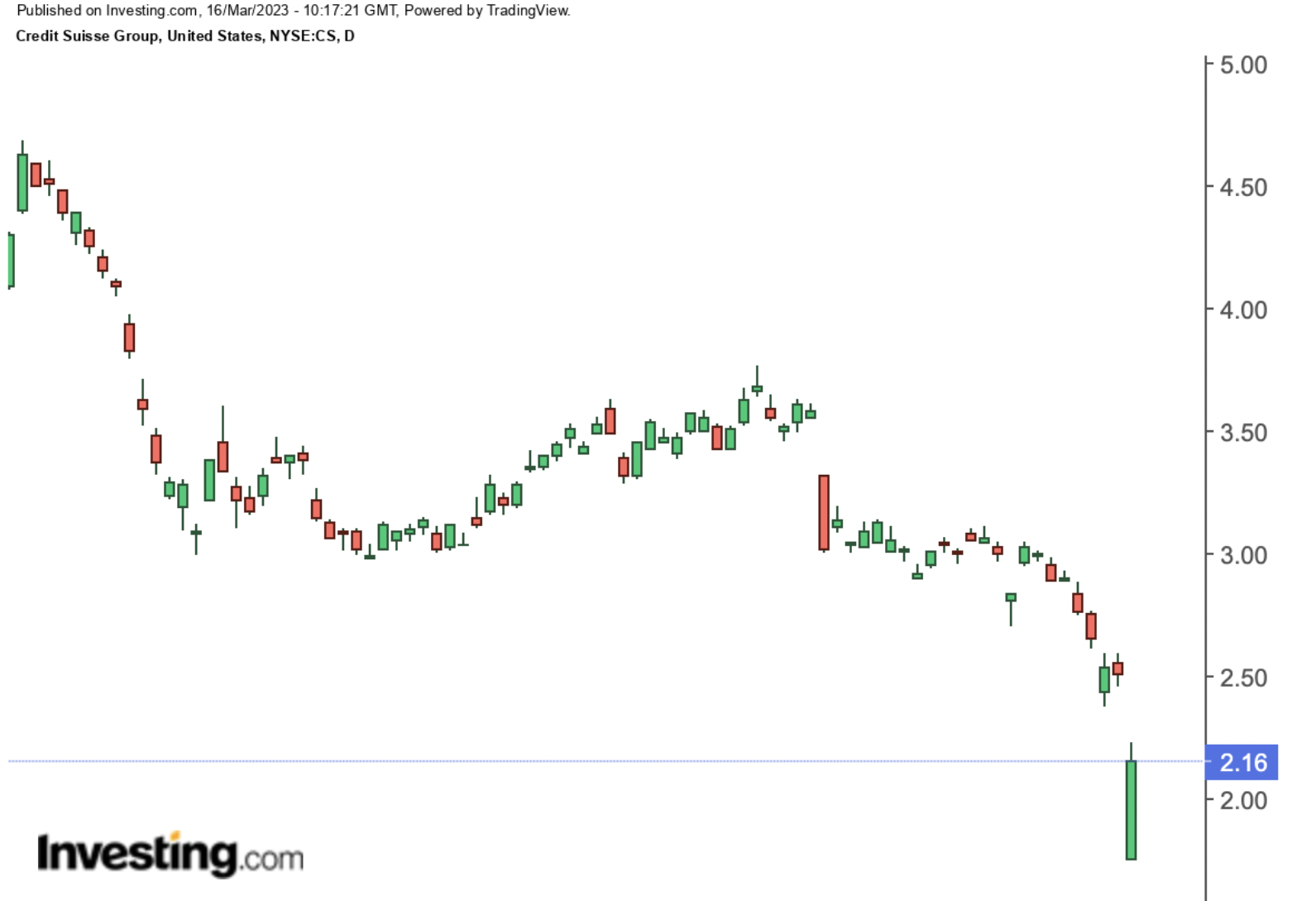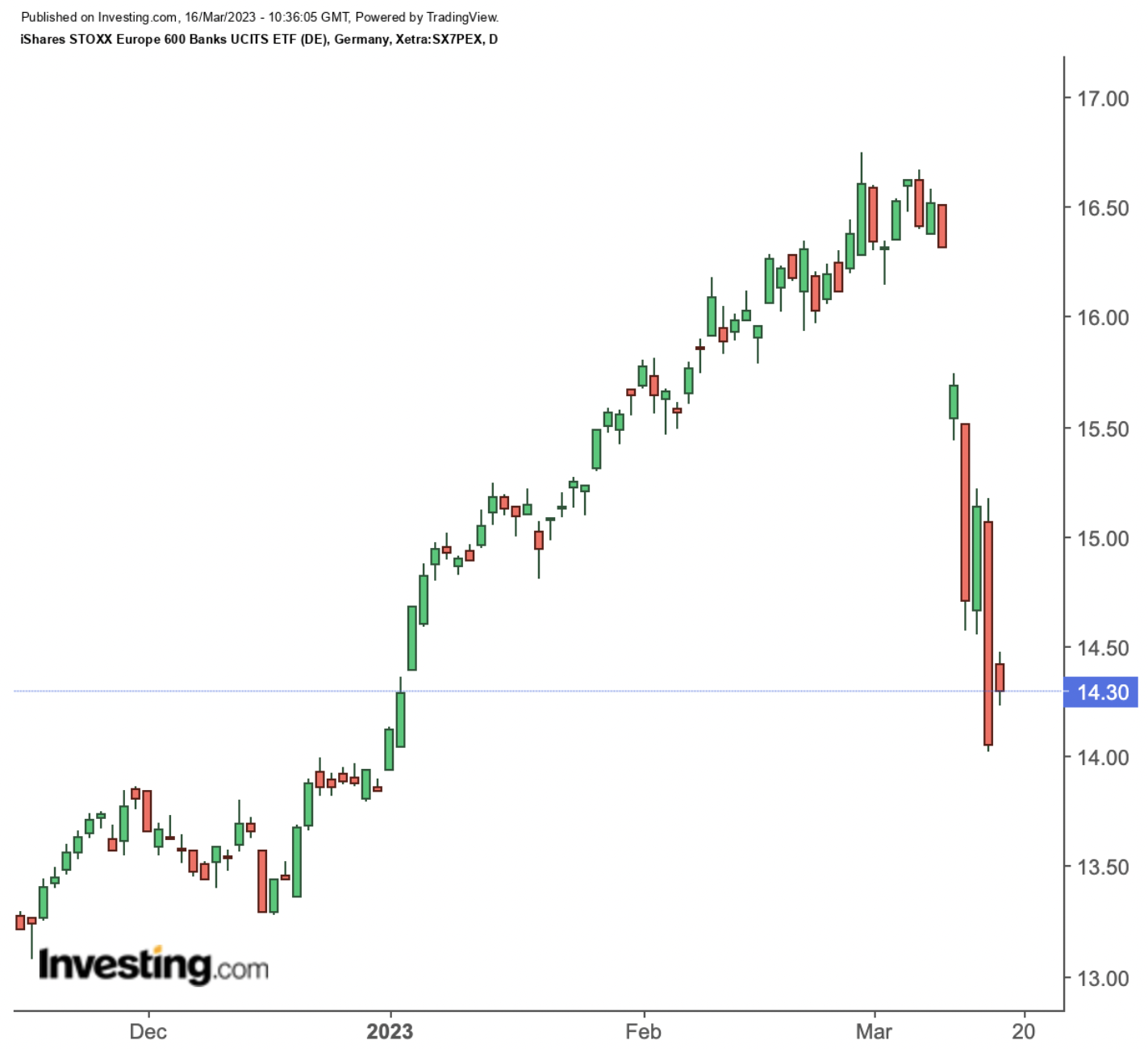- Shares of Credit Suisse (SIX:CSGN) have taken a turn for the worse this week
- Spooked investors started selling the stock, anticipating that the systemically crucial bank was in trouble before SNB stepped in to calm the markets
- The fear remains that Credit Suisse's problems are just the tip of the iceberg
Credit Suisse (NYSE:CS), the second-largest bank in Switzerland with a long-standing 167-year history, has been embroiled in controversy for many years now. Accused of manipulation, tax evasion, and money laundering, CS has been losing significant market share. This backdrop has taken a heavy toll on the bank's reputation due to negative news coverage and substantial fines imposed by European authorities in recent years.
However, the long-term situation took a turn for the worse this week, as the closures of Silicon Valley and Signature Bank by U.S. regulators sparked fears of a contagion effect, as investors reckoned that bank runs could soon occur in Europe's frailer banks, which would likely impose solvency difficulties for Credit Suisse.
As a result of these fears, CS shares dropped by a whopping 28% pre-market, hitting a record low of $1.75 a share, later rebounding to finish the day at $2.16. Still, CS is down 71% over the last year.

If that wasn't enough, CS's earnings and customer base have been declining since the first half of last year, leading to doubts regarding the effectiveness of overall supervision of the banking system.
According to the annual report released on March 14, the bank lost $8 billion. Earlier, the bank had delayed its 2022 report, which was a cause of concern for its clients. The SEC stated that this was due to technical evaluation and revision.
Assessing the Situation
First, SVB's bankruptcy scared the markets this week. It was not just Credit Suisse. Deutsche Bank (NYSE:DB) and BNP Paribas (OTC:BNPQY) were also among the biggest losers. As a result, the benchmark iShares STOXX Europe 600 UCITS ETF (ETR:STOXXIEX) plummeted by 7% yesterday.

The rout in European banks started as SVB's failure impacted Credit Suisse's shares on Monday, and then the high losses and cash outflows in the annual report further accelerated it. Yesterday, Saudi National Bank's stance, a 9.9% shareholder, led to a big decline in the stock price.
Ammar Al Khudairy, president of Saudi National Bank, stated that they will not provide financial support due to legal and regulatory issues and that they do not believe the bank needs much support.
Khudairy added they were surprised by the interest they received when they raised their stake to 9.9%, which is about 2.5% of their assets. As a result, Credit Suisse shares fell 13.9% intraday, closing at $2.16.
Two noteworthy events took place later in the day. Firstly, the US Treasury Department announced that it was examining the situation and assessing the potential impact of Credit Suisse on American banks.
The ECB will also participate in the investigation. Nevertheless, the decisive factor in this matter is the course of action the Swiss National Bank (SNB) took.
After a meeting with the ailing bank, SNB made a statement in the evening and announced that it would provide liquidity if necessary. The statement noted that Credit Suisse was in compliance with the capital and liquidity requirements for systemically important banks and that there was no counterparty risk.
The statement also sought to reassure the markets that the problems experienced by some US banks did not pose a direct risk to Swiss banks and that the legal and regulatory process was being closely monitored.
In the morning, a statement from Credit Suisse said that the bank would take advantage of liquidity by borrowing CHF 50 billion from the central bank.
The anxiety that Credit Suisse has created in the markets this week has been very high and has yet to subside. However, the quick action taken by the Swiss National Bank may help to calm the markets.
But, the real fear remains that this is just the tip of the iceberg.
Disclosure: The author doesn't own any of the securities mentioned.
